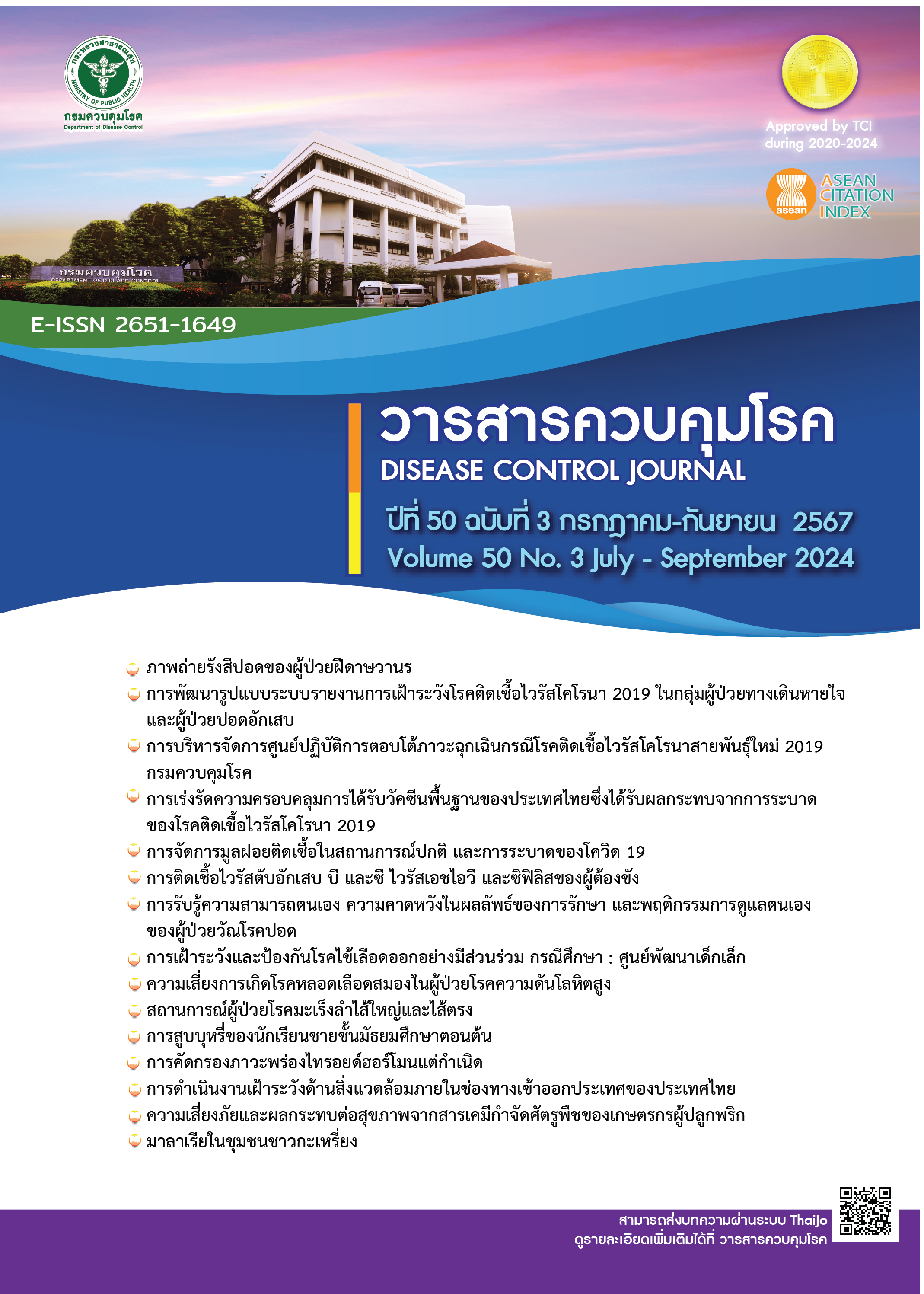Investigation of malaria outbreak in a Karen hill tribe community, Ban Rai District, Uthai Thani Province between April and May 2023
DOI:
https://doi.org/10.14456/dcj.2024.45Keywords:
Malaria investigation, Karen ethnic community, Ban Rai District, Uthai Thani ProvinceAbstract
Uthai Thani Provincial Health Office was alerted by Ban Rai Hospital regarding the detection of five confirmed cases of malaria among the Karen hill tribe community situated in Village Group No. 2, Kaen Makrut Subdistrict, Ban Rai District, Uthai Thani Province. These malaria cases were reported between April 14 and May 9, 2023. Subsequently, an outbreak investigation team was deployed to the affected area from May 10-12, 2023, to validate the diagnosis, characterize the epidemiological profile of the confirmed cases, identify potential sources and modes of disease transmission, and provide recommendations for disease prevention and control. The study employed a descriptive research design. During the investigation, the team meticulously scrutinized medical records and conducted an active case finding among 166 villagers in Village Group No. 2, utilizing a specialized case investigation form developed by Division of Epidemiology and Rapid Diagnostic Test (RDT) kit. Individuals testing positive via RDT underwent further examination using the thin/thick film method and among 166 villagers tested, 1 Plasmodium vivax case was detected. The investigation team confirmed a total of six cases of P. vivax malaria. The majority of affected individuals were male agricultural laborers with a history of travel between the village and neighboring provinces classified as malaria high-risk areas. The investigation team observed that communal living conditions within the community futher amplified the risk of infection. While the principal vector, i.e., Anopheles minimus mosquitoes and larvae were identified, Plasmodium spp. was not detected in the adult mosquitoes. It was observed that a significant proportion (98.19 %) of villagers relied on conventional mosquito nets for sleeping, with only one-fifth (21.08%) possessing awareness regarding the disease-causing potential of mosquitoes, and a minority (4.82%) utilizing mosquito repellents for personal protection. This circumstance significantly heightened the risk of potential future outbreaks. In light of these findings, the investigation team recommends continuous surveillance, intensifying awareness campaigns concerning the disease and advocating for self-protection measures, particularly in anticipation of the outbreak season. Moreover, the provision of resources for disease prevention and control, alongside the implementation of surveillance measures targeting individuals with a history of travel from high-risk areas, is strongly recommended.
Downloads
References
Department of Disease Control (TH), Vector-Borne Disease Division. Guidelines for clinical management of malaria 2021. 1st ed. Nonthaburi: Department of Disease Control (TH); 2021. (in Thai)
Department of Disease Control (TH), Thailand Malaria Elimination Program. Disease Situation [Internet]. [cited 2024 Apr 17]. Available from: https://malaria.ddc.moph.go.th/malariaR10/home.php (in Thai)
Department of Disease Control (TH), Vector-Borne Disease Division. Guidelines for managing malaria for medical and public health personnel in Thailand. 1st ed. Nonthaburi: Vector-Borne Disease Division; 2019. (in Thai)
National Malaria Elimination Strategy, Thailand 2017-2026.1st ed. Bangkok: National Malaria Elimination Strategy; 2016. (in Thai)
Department of Disease Control (TH), Division of Epidemiology. Case definition for Communicable Disease Surveillance, Thailand, 2020. Nonthaburi: Department of Disease Control (TH), Division of Epidemiology; 2020. (in Thai)
Department of Disease Control (TH), Vector-Borne Disease Division. Guide to eliminating malaria for public health officials at the sub-district levels. 1st ed. Nonthaburi: Vector-Borne Disease Division; 2019. (in Thai)
Department of Disease Control (TH), Vector-Borne Disease Division. Manual for Surveillance of Disease Carriers. Nonthaburi: Vector-Borne Disease Division; 2016. (in Thai)
Yurasri S, Pruangpreechasak P, Kanpakdee P, P honsingh P, Chuanngoolearm P, Unnawin W. Malaria investigation in Danchang Sub-district, Nakklang District, Nong Bua Lamphu Province, October 25-26, 2022. Journal of The Office of Disease Prevention and Control 8 UdonThani 2022;1(3):33-40. (in Thai)
Samathong P, Promchat C, Buakruen S, Wongkwankrom W, Tidthian W. An investigation of malaria outbreak in Chompoo Sub-district, Noen Maprang District, Phitsanulok Province. Journal of Disease Preventive and Control : DPC.2 Phitsanulok 2022;9(2):93-103. (in Thai)
Department of Disease Control (TH), Vector-Borne Disease Division. Guide to Malaria Elimination For Thailand's Local Administrative Organizations and the Health Network. 1st ed. Nonthaburi: Department of Disease Control (TH); 2019.
Downloads
Published
How to Cite
Issue
Section
License
Copyright (c) 2024 Disease Control Journal

This work is licensed under a Creative Commons Attribution-NonCommercial-NoDerivatives 4.0 International License.
Articles published in the Disease Control Journal are considered as academic work, research or analysis of the personal opinion of the authors, not the opinion of the Thailand Department of Disease Control or editorial team. The authors must be responsible for their articles.






